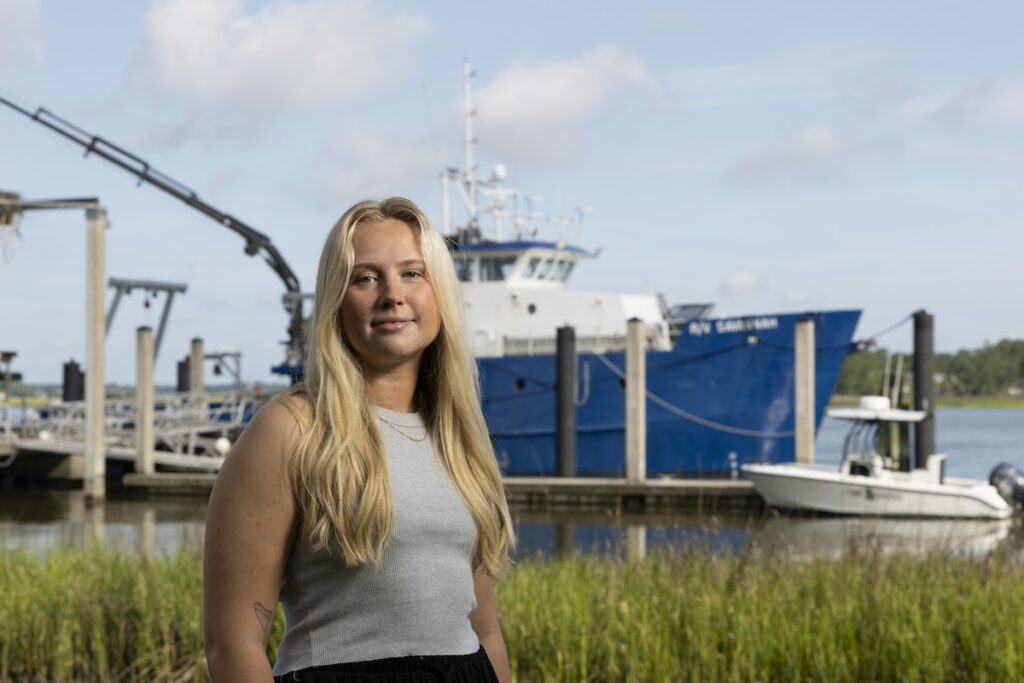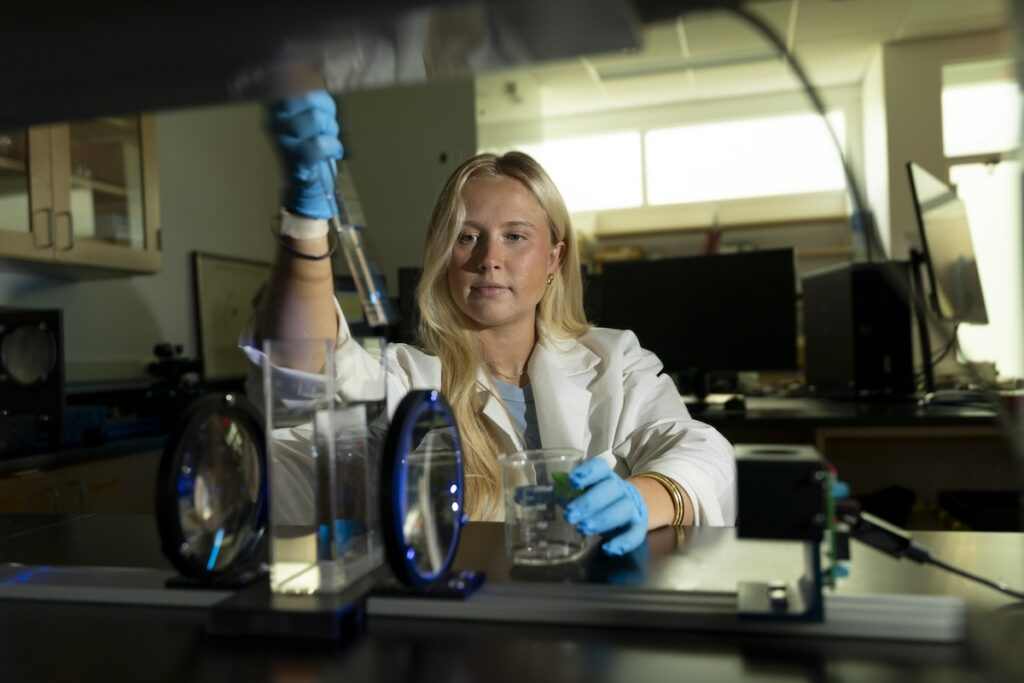
Childhood ocean adventures drive UGA student’s marine science research.
Grace Mann sat in her principal’s office at Salem High School in Virginia and told her principal something he surely had never heard before. Despite being new to the school, she informed him she’d have to take a few weeks off. She would be representing her home country, the Turks and Caicos Islands, in the Youth Sailing World Championships in China.
Mann, now a master’s student at the University of Georgia Skidaway Institute of Oceanography, was not only new to Salem High. She was also new to life in the United States. She spent her first 16 years exploring the reefs, sailing the waves, and walking the shores of the Turks and Caicos Islands. These experiences instilled in Mann a love for the ocean and, eventually, a calling to protect it.
Her English-born dad and Texas-bred mom met in the early ’90s while working as dive instructors before becoming underwater photographers and starting a family.
Mann traces her academic career in oceanography to her parents.
“I can go back and look at the photos they took in the ’90s and see the structure and incredible size of the reefs that used to be there, compared to what I’m seeing now whenever I’m diving back home,” Mann says.

Getting back to the ocean
The family’s move to Virginia in 2016 only fueled Mann’s interest in oceanography and environmental preservation. Being landlocked in Salem, over 1,000 miles away from her home islands, Mann mostly kept up with the ocean through documentaries like The Blue Planet and Sharkwater.
She was unsettled seeing the beautiful waters and marine ecosystems of the Turks and Caicos Islands change drastically while she wasn’t there. It solidified her desire to pursue marine science.
“It was this feeling of inability to do anything from where I was,” Mann says. “It was a need to do something.”
In 2020, Mann enrolled at Jacksonville University in Florida, where she studied marine biology and competed on the sailing team. She took an internship back home at the Turks and Caicos Reef Foundation and learned about marine preservation and the power of research. She spent a semester on a research cruise to the protected island of East Caicos, diving daily to survey the reef and check for stony coral tissue loss disease.
The work was one thing, but she also spent time working and socializing with researchers from various international institutes participating in the project.
“I got to interact with all of these amazing people and be inspired and see all of these different paths that I could take,” Mann says. “It reinforced that research was something that I wanted to do.”

Off to Skidaway
Mann enrolled at UGA in the Franklin College of Arts and Sciences’ Department of Marine Sciences and moved to Savannah to pursue her graduate education in marine sciences at the Skidaway Institute and work in the lab of biologist Adam Greer.
In Greer’s Zooplankton Ecological Responses to Ocean Conditions (ZERO-C) Lab, Mann is researching ecology on the mid-shelf of the South Atlantic Bight. Specifically, she’s looking at how upwelling, the process of ocean currents bringing nutrient-rich water to the surface, sustains a single-cell organism called radiolaria and other zooplankton.
Mann regularly travels on research cruises aboard the 104-foot Research Vessel Savannah, runs the ZERO-C Lab Instagram account, and works with local high school students to teach them about oceanographic research.
To conduct their research, the lab group uses a fleet of shadowgraph imaging devices, including a benchtop imaging system, a handheld device, and another that can snap photos of plankton while being towed behind a vessel. Considering her parents’ careers, Mann was drawn to the visual component of the research.
“I had been exposed to photography for a long time,” Mann says. “This whole idea of imaging and getting to share that was really interesting and full circle for me.”
Mann, who plans to graduate in December, is seeking fellowships in marine policy or working with government and conservation organizations. After her experiences at the Skidaway Institute, Mann feels confident in communicating the need for action to protect the oceans to nonscientists.
“Science needs to be more accessible for people,” Mann says. “That’s the only way we can bridge the gap and have people believe in science.”
Written by: Jackson Schroeder
Photography by: Andy Tucker & Submitted
Design by: Andrea Piazza
This article was originally published in the University of Georgia’s Beyond the Arch.


